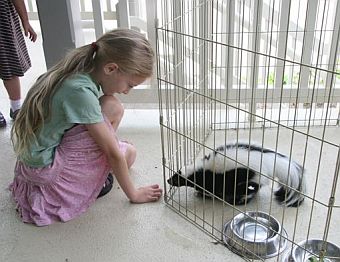
2 October 2008
Pictured here, safely “deodorized” and in a cage, is the only docile animal that strikes fear in my heart.
This September was the “month of skunks” for me, beginning on the first night of our Maine vacation. After 9 hours of sitting in airports, airplanes, and buses we arrived at our hotel. Though it was 9:00pm we needed to stretch our legs so we took a walk around the parking lot.
At the wildest corner of the parking lot — if a collection of shrubs can be called “wild” — I smelled a hint of something unpleasant. Fox? We took a few more steps in the dark. Is that a black cat at the edge of the lawn? No! A skunk! I grabbed my husband’s arm and we jumped back a step. There were two skunks near the trees and one of them was stamping his feet. We were out of there!
A similar thing happened the next night – different place, different time, another skunk in the dark – so when the Animal Rescue League Wildlife Center brought a disarmed skunk to the Group Against Smog and Pollution picnic last Saturday, I was intrigued. Here was a skunk I could get close to. Here’s what I learned:
- Skunks have good senses of hearing and smell (imagine!) but they cannot see beyond about 10 feet.
- They have muscles near their anal scent glands which allow them to accurately spray 7-15 feet.
- Their scent gland is empty after 5-6 sprays and it takes 10 days to refill so they conserve the spray by warning you with foot stamping, hissing and holding their tails high. (Thank heaven!)
- Even when a skunk’s scent glands are removed the scent is still part of them, though fainter. If you handle a skunk, you will pick up that faint scent on your hands and clothes. After a while you won’t notice it but members of your carpool will.
- Skunks can carry rabies for five or six generations without exhibiting symptoms. That’s why pet skunks must come from breeders, not from the wild.
And how does this relate to birds?
It turns out that the skunks’ only wild predator is the great-horned owl. Apparently the owl doesn’t mind the smell.
(Thanks to Maren Cooke for the picture of “Mario Le Pew” from the ARL Wildlife Center getting acquainted with her daughter, Innes Donahue, at the GASP picnic.)
A few years back in late evening, we smelled a very strong scent of skunk and then it was gone….walking thru the yard a few days later, I found the top part of the scalp of a skunk….so it was here and very quickly taken away for a meal for the Great Horned Owl.
Skunks are great for getting the grubs in your lawn and also will devour yellow jacket nests in the ground or even in low shrubs. If I find the yellow jackets, I put some kind of scent(tuna water is good), so the skunk (or raccoon) will find them and dig them up…much safer for me and so much better than using gas and lighting the nest.
Ever notice how different the patterns are? Some are almost black with a little white, others are the opposite…I can tell the difference by their patterns…one even had a white triangle on it’s head…
Skunks are kind of cool but not when your dog gets skunked…trick here is NOT to use water right away…that sets the scent….my husband washed our little Lady dog after she got sprayed and thought he had all the scent off, until his mom asked him at church the next day, if he was by a skunk. Lady wasn’t very pleasant for weeks either.
“Mario le Pew”?! Now that’s a stinker of a pun. 😉
Last summer a mother skunk left 5 orphaned young living below the shed in our yard. They began to follow me, making little hopeful grunting noises. I buried cat treats for them and they dug them out. They stuck around for a couple of weeks and then one by one they disappeared. I like to think they made their own way somehow, but it’s more likely they became victims of a predator like an owl or crow.
Skunks have always been my favorite animal since seeing “Flower” in Bambi, and this only reinforced my opinion of these gentle, adorable animals.
Love this! I’ve always wanted a pet skunk. Now that I know about the smell even without the glands, probably a good thing it never worked out. HA!